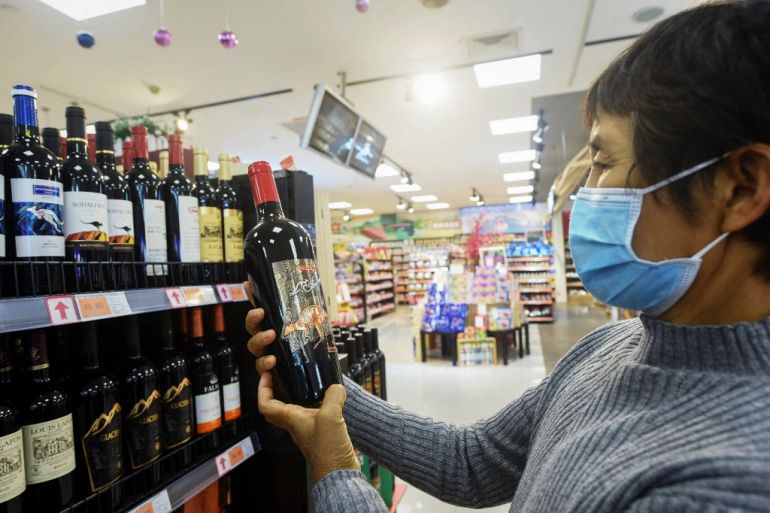Australia takes wine dispute with China to WTO as sales plunge
Wine tariffs imposed by Beijing doubled or tripled the price of Australian wine and made the Chinese market unviable for exporters.

The Australian government said on Saturday it was lodging a formal complaint with the World Trade Organization about China’s imposition of anti-dumping duties on Australian wine exports, escalating further the trade standoff with Beijing.
“The government will continue to vigorously defend the interests of Australian wine makers using the established system in the WTO to resolve our differences,” Dan Tehan, minister for trade, tourism and investment, said in a joint news release with the Agriculture Minister David Littleproud.
Keep reading
list of 3 itemsChina-Australia ties under strain
Australian spy novelist Yang Hengjun faces China espionage trial
Relations with China, already rocky after Australia banned Huawei from its nascent 5G broadband networking in 2018, have worsened since Canberra called for an international inquiry into the origins of the coronavirus, first reported in central China last year.
China, Australia’s largest trading partner, responded by imposing tariffs on Australian commodities, including wine and barley and limited imports of Australian beef, coal and grapes, moves described by the United States as “economic coercion”.
Last year, Australia launched a formal appeal to the WTO seeking a review of China’s decision to impose hefty tariffs on imports of Australian barley.
The wine tariffs doubled or tripled its price and made the Chinese market unviable for exporters, the Australian government had said earlier.
Australian winemakers shipped just 12 million Australian dollars (US$9m) of wines to China in the four months from December to March, from 325 million Australian dollars (US$243m) a year earlier, industry figures showed, confirming that hefty new tariffs have all but wiped out their biggest export market.
‘Dispute-settlement system’
Earlier in June, Prime Minister Scott Morrison called on the WTO to address the standoff between the two countries and days later won the support of the Group of Seven countries for a tougher stance against China’s growing impact on global trade.
On Saturday, the government said that despite the complaint, Canberra was ready to cooperate with Beijing.
“Australia remains open to engaging directly with China to resolve this issue,” Tehan and Littleproud said in their release.
Saturday’s move came just a week after a summit of the G7 grouping of advanced economies echoed Australia’s call for a tougher stand against China’s trade practices and its more assertive stance globally.
The G7 summit ended on June 12 with the announcement of US-led plans to counter China’s trillion-dollar “Belt and Road Initiative”, the hallmark of its efforts to extend economic influence around the world.
The grouping promised hundreds of billions of dollars in infrastructure investment for low- and middle-income countries in a “Build Back Better World” (B3W) project.
The B3W was seen as aimed squarely at competing with China’s efforts, which has been widely criticised for saddling small countries with unmanageable debt.
Morrison attended the summit as part of a G7-plus formula that also brought in the leaders of South Korea, South Africa and India, and made clear he would push the other nations for joint action against China’s aggressive trade policies.
“The most practical way to address economic coercion is the restoration of the global trading body’s binding dispute-settlement system,” he said in a speech just ahead of the summit.
“Where there are no consequences for coercive behaviour, there is little incentive for restraint,” he said.
Morrison has received explicit backing in his government’s confrontation with China from the US, as well as from French President Emmanuel Macron during a visit to Paris following the G7 meeting.